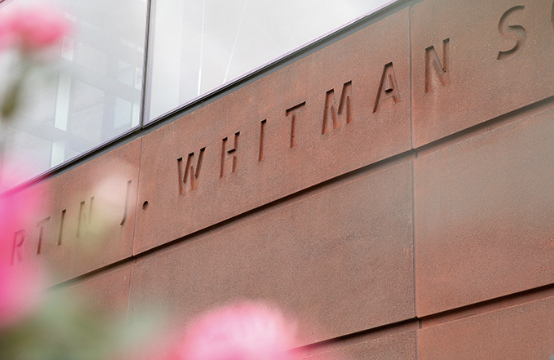You have /5 articles left.
Sign up for a free account or log in.

The Nass Mental Health Initiative at Syracuse University’s Martin J. Whitman School of Management is funded by a $500,000 gift from alumni donors David and Dina Nass.
Syracuse University
Marketing, finance, supply chain dynamics and … well-being? Mental health may not be the first thing that comes to mind when thinking about business studies, but leaders at Syracuse University’s Martin J. Whitman School of Management think the two go hand in hand. That’s why they’ve launched a new initiative supporting students’ professional development in this area, with donor support.
“As we prepare students for a lifetime of professional success, I can’t think of a more important skill we can provide them with than one that will aid in dealing with the personal challenges that they—or their friends, family members and teammates—are going to face,” says Whitman’s interim dean, Alexander McKelvie.
What it is: The “forward-looking” initiative helps Whitman’s students in three ways, says McKelvie: it prepares them for the significant obstacles that they’ll face in industry, supports them in identifying and supporting others as they face challenges, and holistically develops students’ core skills, formerly known as soft skills, not just the technical skills that many business programs emphasize—a larger goal at Whitman.
The program involves or will involve undergraduate and graduate coursework, expert guest speakers, symposia and technology.
McKelvie says that addressing issues related to mental health, such as work-life balance, stress, anxiety and dealing with rejection or burnout “can lead to more fulfilling lives and potentially a more reasonable view of success for our students.”
Donor support: Whitman’s mental health push, formerly called the Nass Mental Health Initiative, is funded by a $500,000 gift from alumni donors David and Dina Nass. David Nass, a finance executive at UBS Investment Bank, said in an announcement about the initiative last year that mental health awareness “is critical to educate students and business professionals about mental health awareness and to destigmatize mental health issues.” The program’s goal is to provide students and graduates with “tools and resources to manage daily stressors, maintain healthy relationships and be able to recognize if and when they need to seek support.”
Such skills, combined with the ability to make informed decisions, he added, “can provide the opportunity to live healthy and happy lives while still enjoying a thriving career.”
McKelvie explains that mental wellness is becoming more of a priority in the financial sector. Goldman Sachs, for instance, introduced a Mental Health First Aid program in the U.S. in 2022, certifying employees to become “MHFAiders,” similar to some peer mental health programs adopted by colleges and universities. The company recently announced it wants to have trained 1,000 employees by the end of 2024.
Dina Nass, who majored in psychology at Syracuse, previously worked as a substance abuse counselor and understands the pressures and stigma attached to mental health issues in the workplace, according to information from the university.
The development of the mental health initiative also supports the university’s creation of dual undergraduate and master’s-level public health and business programs within the David B. Falk College of Sport and Human Dynamics on campus.
What’s the need: Pointing to various statistics about working professionals always being on, and the possible downstream effects of that—including chronic stress, burnout and depression—McKelvie says, “It’s become increasingly apparent that this is a useful initiative.” Moreover, “It doesn’t look like any of this crisis is going away anytime soon. Rather, it seems to be getting worse—or at least people are talking about it more.”
Whitman has long emphasized “intangibles” in its curricular and co-curricular programming to better prepare students to deal with their own issues as well as their teammates’, McKelvie continues. Modern management “is no longer a command-and-control, bark-orders style. It’s much better aligned with being a coach and helping others to do well. Young people are also looking for bosses who will understand them, including the personal struggles they face.”
Helping students become better, more empathetic leaders who can connect with their teams and adjust their styles to get better results could ultimately lead to increased employee satisfaction, lower turnover and fewer work-related issues from stress and burnout, he says.
How the program works: McKelvie says the Nass Mental Health Initiative so far has included:
- Data collection and benchmarking against national statistics on mental health
- A workshop on happiness and defining life goals and priorities
- Training for faculty and staff members to identify students in distress
- Whitman wellness week
- Wellness resource fair
- Formation of an advisory group of faculty, staff and alumni experts to help guide programming and priorities moving forward
Additional speakers and workshops are planned, including during an upcoming public health week event in April. McKelvie says he’s seen at least one new course proposal related to the initiative and heard discussions about curricular programming, including among student leadership groups.
Student feedback thus far says the initiative is both welcome and timely, McKelvie adds. He and colleagues also believe the initiative is part of what’s driving Whitman’s increased application numbers, as both prospective students and their parents “see this as valuable training.”
How are you funding co-curricular initiatives that support students’ well-being and lifelong success? Tell us.





